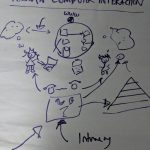You are not alone
Oprah Winfrey
Three years ago, I watched social psychologist Sherry Turkle’s TED talk (2015) and then read her book: Alone Together: Why We Expect More From Technology and Less From Each Other, (2011) which prompted me to write a blog called: Alone Together: Is social media changing us?
Rereading my blog, I see that my opinion hasn’t changed and on checking, neither has Turkle’s. She now consults on reclaiming conversation ™ to stop the flight from face-to-face conversation.
I am not so sure we don’t want to talk face to face at all, rather it’s just technology gives us the option to avoid those particular prickly peeps we’d rather not see face to face if we can.
Added to that, I don’t believe that technology is taking us to places we don’t want to go. We have no idea what we are doing online or where we need to be, and I am tired of hearing technology described as an unstoppable force outside of our control as if it were freak weather or a meteorite zooming towards earth about to destroy us all. Economics is often the driver of technological advancement and human decisions drive economics.
Glorious technology
Our behaviour online and towards technology reflects us in all our glory – the good, bad and the ugly – along with all our hopes and fears. I do not believe that we expect more from technology and less from each other. Instead, I believe that we turn to technology to plug the gaps and find solace in those moments when we feel alone, afraid, unloved, and indeed sadly, sometimes, unloveable.
Life can be crushingly hard, and many of us know that there are certain people in our lives with whom we will never have the rich, robust and trusting relationships Turkle believes have been eroded by digital technology. Some people are just not up to the job. It may be the same with our friendships online but the hope is there.
Many of us just want to get in and out of any given, often potentially stressful, situation – work, meetings, the playground, the hospital, the dinner table, events with relatives – without saying or doing anything to cause any bad feeling. So that when we do finally get to our tiny slivers of leisure time we can use them to fill ourselves up with what makes us feel better, rather than analysing what we didn’t get right.
If that means staring at a tiny screen then what’s wrong with that? One person I know spoke of their phone, and the access it gave them to an online friend, a person they hadn’t met at that point, as an Eden between meetings. And, why not? Whatever works.
That is not possible now
Turkle says that we use online others as spare parts of ourselves, which makes me believe that she hasn’t really engaged with people on Twitter in a normal way in conversation, and she hasn’t ever met people who do that offline either. Many people make new friends on Twitter and meet up #irl a long time afterwards and then only occasionally. Their relationships are mainly based online. Rather like families who live a long way away from each other. It doesn’t mean it’s less real or not important. It just means they are physically not there which might be difficult but we don’t want to not have any contact with these people because we love them. Maya Angelou said something really beautiful about this when she was on the Oprah show one time. She said:
Love liberates it doesn’t bind. Love says I love you. I love you if you’re cross town. I love you if you move to China. I love you. I would like to be near you. I’d like to have your arms around me. I’d like to have your voice in my ear. But that is not possible now. So, I love you. Go.
We want to be in contact with people whom we love and appreciate, and who love and appreciate us in return. Those people who make us remember the best bits about ourselves. We like people who like us. It is that simple and these people are not always in our daily lives. It’s not for nothing that vulnerability expert Brene Brown says that people armour up everyday to get through the day.
To cultivate the sorts of relationships Turkle feels that we should be having without our phones takes not only a lot of time and energy (and Brene Brown books) but a fearlessness which is not easy. Our greatest fear is social rejection and a robust conversation can leave us badly bruised. Online it is slightly easier because if a person drops out of your life, then you have some control over the day to day reminders unless you turn stalker, which is understandable as the grief of any online loss feels just as real. However, know this:
You are not alone
When we seek answers to our problems emotional like grief, or physical, spiritual, legal, fiscal. Technology really does say: You are not alone.
In real life, difficult relatives and tough-love friends don’t make the best agony aunts and may make us want to keep our questions to ourselves. We may forgo the embarrassment or shame by keeping our anonymity and seeking counsel elsewhere. Giving and receiving advice makes the world go round. In the book Asking for a Friend, the history of agony aunt columns is given over three centuries, and even today with all our technology, they remain as popular as ever.
But, if we can’t wait for our favourite agony aunt or uncle, a quick google/bing or peek round Quora can give us the reassurance we need. No, we are not shoddy, terrible people. Our thoughts and feelings are completely normal. The article What’s wrong with Quora? says that we may prefer a dialectic communication (a chat) say on Twitter, but we don’t use it in the same way as the didactic Q and A on Quora. We may never join Quora or Mumsnet but plenty of us (lurkers) use these and similar forums to find answers and feel better about the difficult circumstances we often find ourselves in.
It is reassuring to know that someone somewhere has already asked the question, either under a real or false name, and some other lovely human has written something underneath which just may help.
I don’t really believe that anyone of us is afraid of having a regular conversation because we have a phone. Turkle mentions research done on teenagers a lot, but they are specific user group and shouldn’t be taken as representative of the general population nor the future. How many teenagers want to talk to anyone? The teenage years are torture. As adults, however, because of the way society is set up, we often have to spend time with people we wouldn’t choose to, at work or in families. In the past we may have tried harder, felt shittier, been robust or at least tried to tell ourselves that, nowadays, it is more acceptable, a relief even, to be alone together, and to save our thoughts and feelings for those we love and who love us in return, wherever and whenever they may be.







3 comments